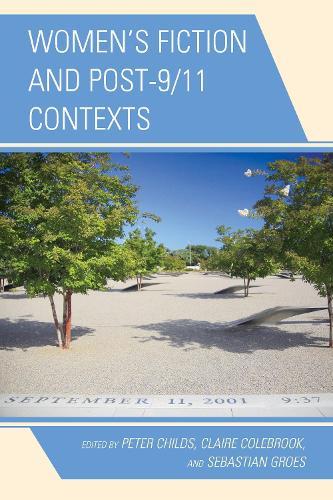Overview
9/11 is not simple a date on the calendar but marks a distinct historical threshold, ushering in the war on terror, various states of emergency, a supposed “clash of civilizations,” and the putative legitimation of counter-democratic procedures ranging from extraordinary renditions to enhanced interrogation. Perhaps no date, since Virginia Woolf declared that “on or about December 1910 human character changed,” has marked such a singular point in the perception of time, identity and nature. Women’s writing has always been something of a counter-canon, offering modes of voice and point of view beyond that of the “man” of reason. This collection of essays explores the two problems of what it means to write as a woman and what it means to write in the twenty-first century.
Full Product Details
Author: Peter Childs ,
Claire Colebrook ,
Sebastian Groes ,
Roberta Garrett
Publisher: Bloomsbury Publishing Plc
Imprint: Lexington Books
Dimensions:
Width: 16.00cm
, Height: 2.20cm
, Length: 23.90cm
Weight: 0.481kg
ISBN: 9781498500951
ISBN 10: 1498500951
Pages: 234
Publication Date: 21 October 2014
Audience:
Professional and scholarly
,
Professional & Vocational
Format: Hardback
Publisher's Status: Active
Availability: In Print

This item will be ordered in for you from one of our suppliers. Upon receipt, we will promptly dispatch it out to you. For in store availability, please contact us.
Reviews
This is a fascinating, wide-ranging and intellectually stimulating over-view of a number of important contributions to post-9/11 fiction by women. The essays here cover many vital contemporary issues from Aesthetics, the Spectacle, Gender politics and the representation of Islamic experiences. The book offers provocative and radical readings of texts that have, often in subtle, oblique and symbolic ways responded to the tense, uncertain mood and atmosphere of the opening decade of the twenty-first century. -- Martin Randall, University of Gloucestershire
This is a fascinating, wide-ranging and intellectually stimulating over-view of a number of important contributions to post-9/11 fiction by women. The essays here cover many vital contemporary issues from Aesthetics, the Spectacle, Gender politics and the representation of Islamic experiences. The book offers provocative and radical readings of texts that have, often in subtle, oblique and symbolic ways responded to the tense, uncertain mood and atmosphere of the opening decade of the twenty-first century. -- Martin Randall, University of Gloucestershire This remarkable volume mines an unexpected niche in the aftermath of the twenty-first century's supposed trip-wire event (or sucker's trap), 9/11, by tracking its import not in geo-politics or imperial decline but, less obviously, in women's writing-and the writing of woman. Here it locates an unexamined corridor and portal already opening onto the era of climate change and ecocide which the former event, to a significant degree, masked. The result is a bravado collective performance which displays, unexpectedly, the surgical import of literary thought, today, and a writing that never had signed on to the mythographies of 9/11 or to the so-called Anthropocene that has replaced it as a new, again gender-marked, Potemkin alibi of the times. -- Tom Cohen, University at Albany, State University of New York
This is a fascinating, wide-ranging and intellectually stimulating over-view of a number of important contributions to post-9/11 fiction by women. The essays here cover many vital contemporary issues from Aesthetics, the Spectacle, Gender politics and the representation of Islamic experiences. The book offers provocative and radical readings of texts that have, often in subtle, oblique and symbolic ways responded to the tense, uncertain mood and atmosphere of the opening decade of the twenty-first century. -- Martin Randall, University of Gloucestershire This remarkable volume mines an unexpected niche in the aftermath of the twenty-first century's supposed trip-wire event (or sucker's trap), 9/11, by tracking its import not in geo-politics or imperial decline but, less obviously, in women's writing-and the writing of woman. Here it locates an unexamined corridor and portal already opening onto the era of climate change and ecocide which the former event, to a significant degree, masked. The result is a bravado collective performance which displays, unexpectedly, the surgical import of literary thought, today, and a writing that never had signed on to the mythographies of 9/11 or to the so-called Anthropocene that has replaced it as a new, again gender-marked, Potemkin alibi of the times. -- Tom Cohen, University of Edinburgh
This is a fascinating, wide-ranging, and intellectually stimulating over-view of a number of important contributions to post-9/11 fiction by women. The essays here cover many vital contemporary issues from Aesthetics, the Spectacle, Gender politics and the representation of Islamic experiences. The book offers provocative and radical readings of texts that have, often in subtle, oblique and symbolic ways responded to the tense, uncertain mood and atmosphere of the opening decade of the twenty-first century. -- Martin Randall, University of Gloucestershire This remarkable volume mines an unexpected niche in the aftermath of the twenty-first century's supposed trip-wire event (or sucker's trap), 9/11, by tracking its import not in geo-politics or imperial decline but, less obviously, in women's writing-and the writing of woman. Here it locates an unexamined corridor and portal already opening onto the era of climate change and ecocide which the former event, to a significant degree, masked. The result is a bravado collective performance which displays, unexpectedly, the surgical import of literary thought, today, and a writing that never had signed on to the mythographies of 9/11 or to the so-called Anthropocene that has replaced it as a new, again gender-marked, Potemkin alibi of the times. -- Tom Cohen, University at Albany, State University of New York
Author Information
Peter Childs is professor of modern and contemporary English literature at Newman University. Claire Colebrook is Edwin Erle Sparks Professor of English at Pennsylvania State University. Sebastian Groes is senior lecturer in English literature at Roehampton University.




